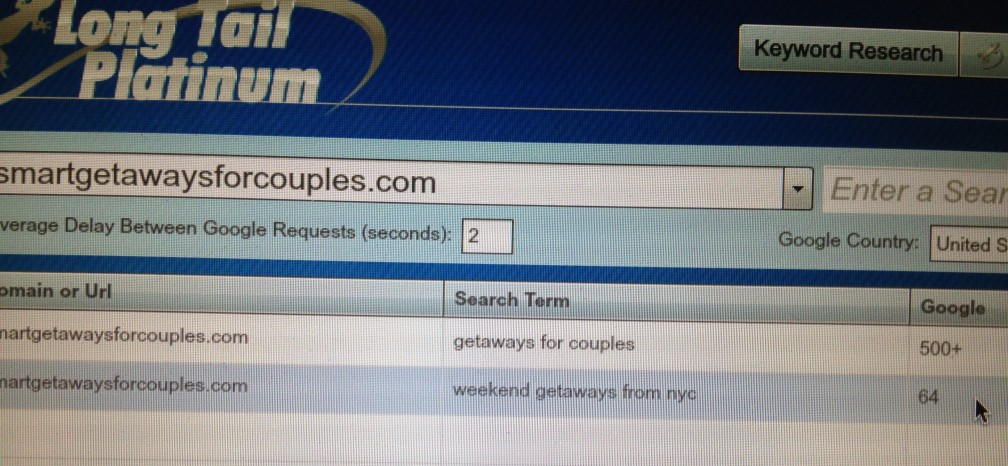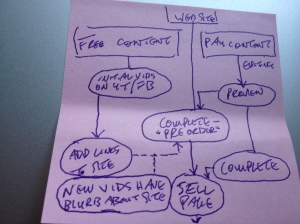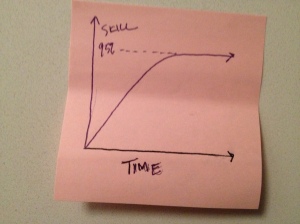Actually it’s a bit reassuring to read that I’m only 3 months into this process. My inaugural post was February 22.
Well, here’s what’s going on lately.
Overview
I definitely feel pulled in four-directions-at-once. Tim Ferriss’ advice (not that he’s the only authority, but he was the impetus for launching this experiment and its blog) is “you have to throw a lot at the wall before you can [see what sticks].” Things I’ve thrown at the wall include-
-A drum DVD/video channel that’s been back-burnered while I see if it attracts any views on youtube. (Part of the reason it’s back-burnered is my market-testing tools got more precise and drum instruction has a pretty poor searches/competitiveness ratio.)
-An idea for a physical product – a hybrid shoe – that would have required either astronomical startup costs or really out-of-the-box thinking.
-Two niche websites based on the template from Pat Flynn’s “niche site duel 1.0”, Smart Getaways for Couples, and the Outer Boros Blog, to both of which I’m still adding content, and for one of which I used some Search Engine Optimization tactics that date from 2010.
Those are the moneymakers, or, more realistically, the case studies, through the trial-and-error of which I’m teaching myself the landscape of passive income. There will likely be another niche website that I’ll speak more about below, but all of the above is only one facet of Four Hour Work Week.
The other themes are crafting the life you think you need riches to live, and finding and focusing on only the things with the highest rate of return.
Basically, there are two things I want to do with my “Four Hour Life”: Travel whenever I want, and produce my web show.
But let’s take things in order.
80/20 ing My Life
The more I get into Paretto’s Principle (google it, but it’s the principle that says in multivariate systems the distribution of inputs and effect is often uneven, and at a bare minimum 80% of the output is usually due to – at a maximum – 20% of inputs, you can find it everywhere blah blah), the more I realize I’m a novice. Yes, just understanding that there is such a thing as 80/20 is a huge step. But I’m not much beyond that.
Here’s what 80/20 has done for me:
-Made me more effective in less time at work.
That’s real, and can work for you, mostly because most of us spend a lot of time on ineffective things at work. Just do the initial 80/20, and you too will realize what’s generating the most results and what’s wasting the most time. Most results for me: uninterrupted stretches of “batched” work, focusing on the few activities where my expertise is required, outsourcing almost everything else. Most wasted time: “defending” myself against allegations of lousy work (the higher ed equivalent of chronic complainers, except unlike Tim I can’t simply stop doing business with them) that don’t materially affect anyone, doing rote administrative tasks a temp or AA could do.
-Made my decision processes easier.
In particular, Tim’s tip about choosing the 3 “force multiplier” things to do each day (part of the reason writing on this blog has been sparse lately, though I do consider it important) has helped me narrow down my goals.
Web Show
Ironically, this was all a way to make it easier for me to do music. I have a web show, called Shed Science with Nate Smith, still in its fledgling stages, that, itself, is kind of my “hack” of music. Hardly anybody in my demographic is using the potential of the web as a low-overhead content distributor. Everyone’s still paying to play in the back rooms of bars, and begging friends and family to come out and pay $20 drink charges. I need to get back to editing and producing more episodes – part of the feeling of overwhelm.
Travel
My goal of travel actually dovetails with one – soon to be two – of my niche sites. (Niche Site: a website offering a go-to resource on something many people are searching for but for which existing information is sparse and/or disparate.) Which may be why I’m pursuing it even though it may turn out to be a less-than-optimal choice of keyword. But writing a travel blog I’m trying to monetize gives me another handy hack – anything I’m reviewing is “business”. I started an LLC with my wife, which will be the umbrella entity for all the ventures.
Psychologically, seeing travel as an investment rather than a discretionary expense has made a huge difference. We’re motivated to travel like it’s our job, because, technically, it is. Especially this year and next, we’re investing in visiting destinations personally to build content for our sites. (Smart Asia Travel is yet to launch as of this writing.)
So in one very real sense, I’m actually already there.
There’s even an argument to be made that by 80/20ing my job and treating travel as investment in my business, I’ve already improved both my hourly earning rate and my leverage with money.
Still, that self-encouragement is only useful insofar as it keeps me hungry. My goal from the start has been singular: make passive income so I can fund my life. To that end, I’m most likely going to be starting a new niche site, and here’s why-
As I wrote in the last post, since the 2010 blog series that I discovered 3 years after its publication, google has changed its algorithms in significant ways. Since the name of the game with niche sites is getting on the first page of google for a highly-searched keyword, many of the original techniques are no longer as effective. But more important than even the google updates is my personal learning curve.
-I’ve used multiple keyword research tools for multiple keywords.
-For a few of the “winners” I’ve purchased domains and set up websites.
-For all of those sites I’ve “powered through” learning the design, and gotten better at conceptualizing a site’s architecture, choosing a theme for it, and customizing it.
-I’ve written tons of posts for those sites, and just returned from one trip I took exclusively to write content about it.
I don’t know if it’s just me – I certainly used a similar process to learn music – but the “get an overview, jump in with both feet, succeed or fail, return to source material with new insight, jump in again, repeat” seems a good way to learn things. (Tim Ferriss, who favors no-wasted-time-learning, would probably take me over his knee for that, though…)
So it’s with the hard-won perspective of having launched three sites and published content for two that I’ll return for my second bite at the niche site apple. Here are a few things I know I can improve-
-Keyword Research
This is the process of using tools to find highly-searched but low-competition search terms. My original keywords were “Best things to do in NYC” and “getaways for couples.” Both had relatively high search volume, but also high competition, especially the first. I now know that to give myself the best chance, I need to find a real “diamond in the rough” keyword, that meets an extremely specific set of criteria, which I’ll detail in later posts.
-Site Design
It’s been a steep learning curve, but I’ve hardly scratched the surface of site analytics. One obvious thing I learned is to make the purpose of my site obvious from the first page and make sure noone is more than few inches either direction from a call-to-action. (Subscribe, order now, whatever.)
Anyway, will write in more detail later in the month but that’s the 10,000-foot-view.








